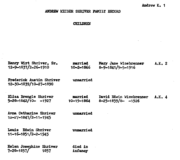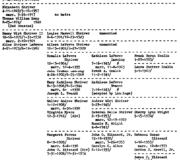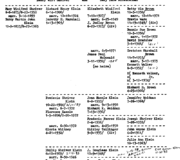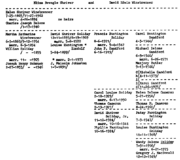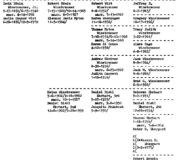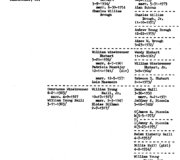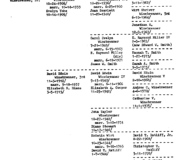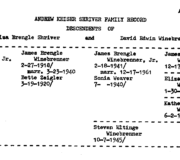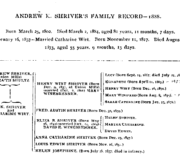THE SHRIVER FAMILY GREEN BOOK.
PART SECOND. NARRATIVES AND RECORDS TO THE PRESENT TIME. 1888.
(Page numbers from 1888 Green Book in [square brackets].)
![]()
Andrew K. Shriver, Union Mills
Business Engagements | Political Relations |
Children with their Connections |
Incidents of the Civil War | Genealogical Records
[89]
ANDREW KEISER SHRIVER, the fifth son of Andrew Shriver, was born at Union Mills. He was baptized by the Rev. Mr. Hinch; sponsors, his father and Christina Krems. In early life he acquired the knowledge of the tanning business at Union Mills, and, later, had the management of the tannery on the place.
He inherited the mechanical genius characteristic of the family, and was well qualified to give directions, as well as take part, in the various business operations of the place.
In the apportionment of his father’s estate he received the Homestead and tannery, and an equal part, with his brother William, in the division of the land.
He was a man of intelligence and generous impulses. A democrat from early manhood, in later years he affiliated with the Republican party, and was a steadfast friend of the Union during the Civil War. Though differing in this respect from his brother William, yet, their diverse political opinions were not allowed to mar the harmony of their social relations, which were always of the most cordial nature. Indeed, the goodness of his heart was proverbial, and drew from the entire community the love and respect which his uniform kindness was calculated to inspire.
He associated his sons, Henry Wirt and F. Austin Shriver, with him in business, firm style A. K. Shriver & Sons.
The Tannery was improved by the erection of enlarged buildings, and the application of modern machinery and steam power. The products [90] of the tannery have been of the highest standard. The firm was awarded a prize medal at the Centennial Exhibition, 1876, Philadelphia, for Texas hide sole leather, “notable for fine finish and close trim,” as the j judges say in their report. They also received the first premium for sole leather, at the Maryland State Fair, held at Westminster. F. Austin Shriver, owing to ill-health, relinquished his interest in the business, and was succeeded by his brother Louis E. Shriver.
CATHERINE SHRIVER, wife of A. K. Shriver, was the daughter of Henry Wirt, a highly respected citizen, of Hanover, Pa.
She was noted for the amiability of her disposition and warm attachments. In sympathy with the domestic habits of her husband, she devoted her life to the comfort and welfare of her household.
The reputation of the old Homestead for hospitality was well maintained while subject to her supervision. She was a pious member of the Reformed Church.
Her death occurred some years previous to that of her husband, who cherished her memory with unfaltering devotion.
Children: Henry Wirt, Frederick Austin, Eliza Brengle, Anna Catherine, Louis Edwin and Helen Josephine.
The sons, as noticed above, have been connected with the business at Union Mills.
ELIZA BRENGLE SHRIVER, their eldest daughter, was married to David E. Winebrenner, of Hanover Pa., where they reside.
ANNA CATHARINE SHRIVER maintains a home at Hanover.
H. WIRT SHRIVER married Mary, daughter of Henry Winebrenner, of Hanover, Pa. His fancily occupies the old homestead, and maintains its reputation for hospitality.
During the Civil War Union Mills shared in the turmoil and danger incident to the times. At the invasion of the Confederate forces, prior to the Battle of Gettysburg, General Meade, commander of the Union Army, had fixed upon the line of Big Pipe Creek* as a [91] suitable place for the concentration of his forces, which would have made Union Mills, owing to its situation on the chief thoroughfare, the seat of the conflict of arms. As it was, something was seen there of the gathering storm of battle. General J. 9. B. Stuart’s (Confederate) Cavalry passed that way the night of the 29th of June, en route to Gettysburg, and encamped upon the premises. He had his headquarters at Westminster, while General Fitzhugh Lee’s were at Union Mills.
*An article in the Century (November number, 1886) states that General Meade directed the Chief of Engineers and Artillery to select a field of battle on which his army might be concentrated, indicating the general line of Pipe Creek as a suitable locality.
The day following, June 30th, the Union troops — the advance of the First Division, Fifth Corps of the Army of the Potomac, under command of Generals Sedgwick and Barnes — encamped there. General Barnes was entertained by A. K. Shriver over night, and occupied the “Irving Room,” so called because the celebrated author had once passed a night there. Officers lodged promiscuously about the premises, a number resting upon the porticos of the house.
F. Austin Shriver, son of A. K. Shriver, in a letter written at the time to his brother H. Wirt Shriver, who was with the “Emergency” troops in Pennsylvania, gives the following interesting account of events: “About eleven o’clock at night Ruth (the colored servant), roused us up, saying the road was filled with horses. Father and I got up, dressed and went down to see. We found the hill, turnpike, lane and all the roads, in fact, filled with troops. An officer drew near and asked if we would like to see the Union troops, to which we made no reply. He then said, ‘well, sirs, I can tell you that you are in the midst of thousands of rebels,’ and he said it in a very threatening way. Father replied, ‘well, sir, I can just tell you that I am a Union man.’ A demand was made by the officer for our horses, but it so happened that they were not conveniently within reach. He thereupon threatened to take us prisoners if the horses were not speedily produced, though he said ‘he would rather have the horses’ (a somewhat dubious compliment), but he soon hurried off without having attained his object. Uncle William’s horses were taken, but on application were returned to him.”
These troops were the same that had the skirmish at Westminster with a small detachment of Union cavalry, and in which the [92] valor of the Union citizens of the place was manifested, Francis Shriver being of the number who participated in the fray.
General Hunt (Century for November, 1886) refers to General Stuart, with the Cavalry Brigades of Generals Fitzhugh Lee, Hampton and Chambliss, who, crossing the Potomac near Seneca, (June 27, 1863), “pushed on through Westminster, where he had a sharp action with a squadron of Delaware horse, to Union Mills, and encamped there the 29th. During the night. he learned that the Federal army was still between him and Lee, on its march north. and his scouts reported its cavalry in strong force at Littlestown, barring his direct road to Gettysburg, wherefore, on the morning of the 30th he moved across the country to Hanover,” where the fight took place with Kilpatrick.
In the same number of the Century Union Mills is given as the position of the Fifth Corps of the Union army on June 30th, 1863.
The following is an extract from A. K. Shriver’s diary, 1863, which further indicates the current of events on this notable occasion:
“Monday, June 29th. — Reports of Rebel cavalry in Westminster. General Fitzhugh Lee’s cavalry arrived here about ten o’clock at night, 8,000 strong — his headquarters in my orchard.
“June 30th. — The Rebel cavalry passed on this morning. This afternoon Fifth Corps Sykes’ Union infantry arrived and encamped in our fields. General Barnes and Staff, headquarters here.
“July 1st. — This morning about 9 A. M. our men left in the direction of Hanover.
“July 2d. — This morning a large body of Union infantry (Sixth Corps) passed by without halting.
“July 3d. — This afternoon 1,000 Rebel prisoners passed here to Westminster. Great battle to-day and victory to the Union.
“July 4th. — 2,000 prisoners passed here. At the same time a cavalryman shot another through the hip while in the act of arresting him.
“July 5th. — Cavalryman arrested last night; he shot at us in the yard. Dr. Pease and John Thatcher (Federals) took him, tied him, and sent him to Gettysburg. [93]
“July 6th. — Wagons still passing here, carrying supplies to the wounded and bring the wounded back.
“July 7th. — Very few wagons passing — getting to be quiet again.”


